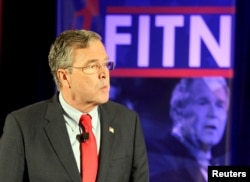To say Ohio is important to Donald Trump is an understatement. No Republican has ever won the presidency without winning the Buckeye State. But as Republicans head home after their contentious national convention in Cleveland, some party elders in Ohio and other key swing states are wondering: does Trump have a strategy that will help them win come November?
In interviews on the convention floor, one party leader said he wondered “what [Trump's] going to do” to overcome the Democratic candidate. Another said he “cringed” at Trump’s style, but added that Trump has the right message, and it has resonated with a lot of people.
While the unorthodox Trump has succeeded in getting unprecedented media attention, helping propel him to the nomination, he has lagged behind in fundraising and in building the type of state-level infrastructure typically seen in other presidential campaigns.
Ohio
“I just spoke to his campaign manager [Paul Manafort], who told me they’re continuing to add offices and they’re going to start putting more emphasis on Ohio,” said Ohio Senator Rob Portman. “Which is good.” Portman faces a tough reelection fight and has been reluctant to embrace the nominee though he is hesitant to criticize Trump.
Not so the state’s governor, John Kasich, a Trump primary opponent who not only refused to endorse him, but did not even attend the convention, instead, holding rival events throughout the week in Cleveland.
With polls showing a tight race between Trump and former Secretary of State Hillary Clinton, the senator speaks of Trump’s unpredictable personality and penchant for launching fierce personal attacks, resulting in a party divide that was on full display in Cleveland.
“He’s going to talk some about [Clinton], and that’s fine,” said Portman. “But I think people are looking for what he’s going to do.” While conceding that Trump will never be a conventional politician, Portman expressed a desire for the nominee to focus more resources on Ohio.
Florida
Ohio is not the only state where party leaders wonder about Trump’s strategy.
No swing state is more important than Florida, which awards 29 Electoral College votes that most experts say Trump must capture if he is to have any chance at defeating Clinton.
“I want to see more. Now that he’s been nominated, I want to see what he’s going to do,” said Dean Narang, the head of Broward County Republicans, an influential bloc of voters in southern Florida. Narang wants Trump to expand his campaign presence in the state where the race is considered tight.
Ahead of the convention, the Tampa Bay Times posted a picture of a sign outside the Trump campaign’s Florida headquarters that said the office was “temporarily closed” while staff work to prepare for the national convention.
“You just can’t do that,” says Lisa Spies, a veteran Republican fundraiser. “Voters have to be able to go to local offices and get information. And Trump doesn’t have those.” But unless the campaign does a better job bringing in money, it won’t have an adequate staff, says Spies, who worked on the primary election campaign of ex-Florida Governor Jeb Bush.
New era in campaigning?
“Traditional campaigning no longer works,” says Missouri delegate Mark Anthony Jones, chairman of the Jackson County Republican Committee. “This is a new era, and he’s showing us how to do it.” Jackson is one who argues that Trump’s high profile means he doesn’t need to spend the same amount of money as Clinton in order to be competitive.
It’s hard to deny that Trump’s strategy is paying off in Missouri. Polls in the state consistently show him with a significant lead. Trump has nearly an 80 percent chance of taking the state’s 10 electoral votes, according to the respected FiveThirtyEight projections website.
“He has the right message. When you don’t have the right message, you need to spend a lot more money,” says Jones. But he acknowledges Trump could be doing a better job appealing to undecided voters, saying Trump’s demeanor could be more presidential.
“I’ve cringed watching some debates; I’ll be honest with you,” Jones says. “But it has worked for a lot of people.”
However, since wrapping up the nomination, Trump has shown few signs he will pivot to a less confrontational demeanor, suggesting disunity in the party may not be remedied anytime soon.
For some party leaders, that’s just fine, as long as Trump delivers results in November.
“Whatever it takes,” says Rob Gleason, chairman of the Republican Party of Pennsylvania, another swing state. “We’re ready to go. We’re going to do whatever we need to do to put him over the top.”









